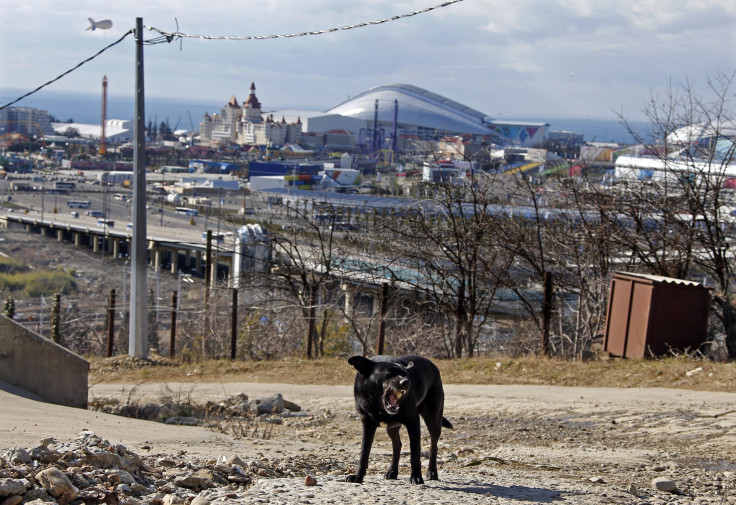Sochi Problems: 2014 Winter Olympics May Have Saved Hundreds Of Stray Dogs

SOCHI, Russia -- The roughly 15 minute bus ride from the Russkiy Dom hotel complex to the Olympic Park isn’t a particularly scenic route.
Patches of the Black Sea resort town have very little to admire other than the occasional glimpses of snow-capped mountains and the rare opportunity to actually view the sea.
But a distressing visual on the ride is the occasional sighting of stray dogs. They are a rather aching reminder during the Winter Olympics that not only is a sizable portion of Russia’s citizens suffering from neglect but so are domesticated pets.
Though stray dogs have been a problem plaguing Sochi well before the start of the Olympics, construction in the city has been cited as a reason for the reported 2,000 strays, as workers used them as guard dogs to protect buildings. With the buildings complete, the strays lost their value to the owners, the Associated Press reported.
It isn’t rare to spot one of the many strays venturing into roads causing minor traffic breaks, and for the thousands of visiting pedestrians to stop to express concern for a pack of homeless dogs. There had been a greater number roaming around near Fisht Stadium during the Opening Ceremony, but there seems to be considerably less now.
(On Wednesday morning, I counted five on my trip, though one stood near a man who may have been the dog’s owner. I also spotted a pair of puppies near the Mountain cluster on Monday night. A majority of the dogs have been Labrador retriever mixes.)
There are a few reasons for the recent decline of dogs on the Sochi streets. A pest control company was hired to catch and dispose of the strays. Basya Services director general Alexei Sorokin said that some of the dogs were biting children and that Sochi has “an epidemic of rabies." In a phone interview with ABC News, Sorokin suggested the dogs were a threat to the Olympics.
“Imagine, if during an Olympic game, a ski jumper landed at 130 kilometres an hour [more than 80 mph] and a dog runs into him when he lands. It would be deadly for both a jumper and for the stray dog,” Sorokin said.
“Dogs must be taken off the streets even if that means putting them to sleep,” he added.
When news spread of euthanasia through social media, third parties stepped in.
Numerous activists have picked up dogs and found temporary homes for them, and billionaire Russian aluminum magnate Oleg Deripaska’s decided to rescue nearly 150 by funding a Sochi dog shelter.
“My first dog I found in the street of my village, the tiny village [where I grew up],” Deripaska told the BBC. “It was a very close friend for almost five years.”
For many of the Sochi visitors, seeing dogs on the streets is disconcerting, but it’s also a problem in American cities. Rolling Stone magazine reported in 2012 that Detroit had 50,000 abandoned dogs. That number has dropped to below 3,000, according to a January survey.
Prior the start of the Winter Olympics, there had been discussions about the fate of Sochi when the Games end. With the help of Deripaska and several activists, at least the problem of stray dogs has improved.
© Copyright IBTimes 2024. All rights reserved.






















